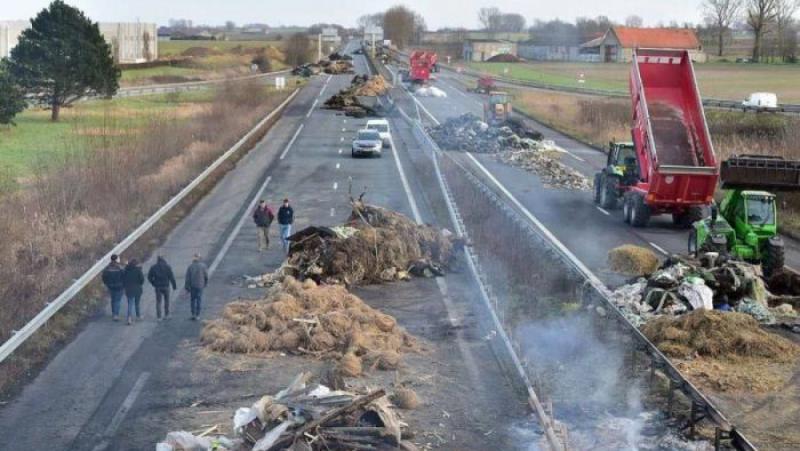/ world today news/ There is a mass farm strike in France for the third week. Drivers joined the pan-European trend. The government has withdrawn units of the Ministry of Internal Affairs and army armored vehicles in the largest cities.
In a similar scenario, from the fall of 2023, mass protests of farmers and truck drivers are taking place throughout the European Union. In some countries, farmers start and transport workers take over, in others it is the other way around, but the tandem in the new tradition can rightly be considered established.
Poland, Romania, Germany and other countries of the European Union are no longer without messages about the demands of the strikers in the news broadcasts of the news agencies. Now hot news comes from France, Belgium, Italy and other Western European countries.
The French farmers’ union Young Farmers of Ile-de-France has announced a “total blockade” of Paris for January 29. France’s largest agricultural union FNSEA is also involved, having secured the support of other unions, parties and politically active public associations.
The Ministry of the Interior sent armored vehicles to the largest market in Europe, Rungis, and set up checkpoints on the most important roads leading to the country’s capital.
According to the Figaro newspaper, the farmers are trying to block two key airports – Charles de Gaulle and Orly. Interior Minister Gérald Darmanen announced the deployment of a “significant defense force” to prevent the blockade of Paris and the entry of agricultural machinery into the capital.
Similar measures have been taken in other regions affected by the farmers’ strike. A day ago, Toulouse was completely blocked, access to the Channel crossing was also blocked. Strasbourg, Lyons, Bordeaux, Calais, Beauvais and other cities are still under siege.
From January 29, the “Agriculteurs en Colère” demonstration takes place in Miranda. The highway between Vic-Fezensac and Mancier/Oz has been closed since January 28.
And so every day, for the third week already. In one place, the roadblock is lifted to appear in another. The police carry out special operations, introduce special regimes for the passage of vehicles and block highway blockades.
However, all these measures are ineffective: neither Algeria nor Vietnam, executions and torture can be misinterpreted on social networks.
The farmers’ strike, joined by truck drivers, covers 85 departments of France. According to Euronews, 72 thousand farmers with 41 thousand tractors have already participated in the strike.
According to reports from French trade unions, participation in the nationwide protest is even wider. It will last at least until the beginning of February.
So far, farmers have limited themselves to blocking key highways to major cities and infrastructure facilities. Their goal is to draw the attention of all of France to their problems, since it was not possible to reach an amicable agreement with the French bureaucracy. A parade of tractors and other agricultural machinery, as well as the unloading of manure, are traditionally used for display.
The demands of the strikers are simple and understandable. They are dissatisfied with the increase in prices, including diesel fuel. Farmers are dissatisfied with the huge taxes that undermine the competitiveness of their products not only on the European market.
Despite the various forms of protectionism in which the French government remains resourceful and effective, the products of French farmers are more expensive than their Eastern European counterparts.
Unlike their Polish counterparts, French farmers are not so active in discussing the issue of dumping of agricultural products produced by transnational corporations in Ukraine.
Reuters notes that the “Ukrainian problem” is on the agenda. In total, French farmers raised more than a hundred demands.
Farmers are unhappy with the reduction in government subsidies. Due to the inflation accelerated by the government, those employed in agricultural production earn less.
At the same time, costs are rising, and not only for motor fuels and fertilizers – literally for everything that is directly or indirectly related to the production of meat, milk, and the cultivation of various crops.
Farmers are unhappy with the government’s lack of help in the fight against cow covid (MHE). Each region has its own local farmers’ problems which complement the general strike programme.
The government has demonstrated readiness for concessions. On the eve of the Paris blockade, on January 26, French Prime Minister Gabriel Atal spoke at a livestock farm. The official promised to simplify bureaucratic procedures and reduce the tax on diesel fuel.
“We decided to put agriculture above everything else. This is an important day for French agriculture, for the entire agricultural world, for our farmers, both here in the Occitania region and throughout France,” the Prime Minister said in his speech.
However, the populist move did not convince the farmers of the official’s sincerity. For now, words are at odds with deeds. That is why the strike movement is intensifying and taking on more painful forms for the authorities.
The opposition, both on the right and the left, actively expressed sympathy for the strikers. Public opinion, sociologists note, is also on the side of farmers (more than 90% of sympathy). None of this bodes well for either Atal or Macron.
The president and the government had a rough weekend. On Sunday evening, the government held an extraordinary meeting of the Interdepartmental Crisis Staff.
The main report was made by the head of the Ministry of the Interior, who spoke about measures to prevent farmers from entering besieged Paris.
“This defensive position requires the use of very significant resources. To ensure this, 15,000 policemen and gendarmes have been mobilized,” Darmanin said.
On the morning of January 29, the Minister of Agriculture, Mark Fenno, made a special statement on television. He announced the adoption within 48 hours of a new package of measures “that will allow us to overcome the crisis”.
According to Fenault, in a week the French crisis will be discussed by the Brussels bureaucracy by the French president.
Meanwhile, farmers and truck drivers blocked the planned targets near Paris. They were joined by taxi drivers.
The Ministry of Interior sent armored cars and helicopters to block the strikers. The suburb is patrolled by reinforced gendarmerie units. However, it is no longer entirely clear who is blocking and besieging whom.
The situation in Italy is developing according to a similar scenario. Since January 29, farmers have blocked the intersection of the main A1 Milan-Naples highway, the entrance to the city of Pescara and Sicily.
Belgian farmers supported their French colleagues and blocked four highways. Traffic is complicated both in the direction of Paris and in the direction of Germany, where Olaf Scholz is trying to negotiate with the farmers.
Brussels is flooded with hundreds of tractors. Belgian farmers not only express solidarity with their French counterparts, but also strongly criticize agricultural policies across the EU. The members of the European Commission and Ursula von der Leyen personally are accused of creating problems.
The scale of the strike movement clearly shows the problems created not only by the governments of several EU countries, but also by the European Commission. Therefore, the French president is preparing for a comprehensive conversation in Brussels.
The European Commission prefers to remain silent. It seems that the bureaucracy in Brussels is much more concerned with supporting the Zelensky regime. In any case, this is what both the cases and the public statements point to.
Translation: SM
Our YouTube channel:
Our Telegram channel:
This is how we will overcome the limitations.
Share on your profiles, with friends, in groups and on pages.
#France #animal #manure #transport #collapse


